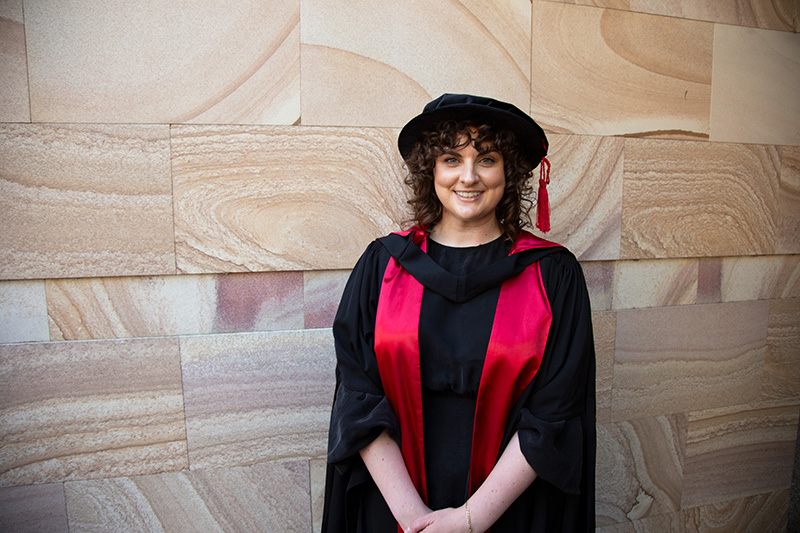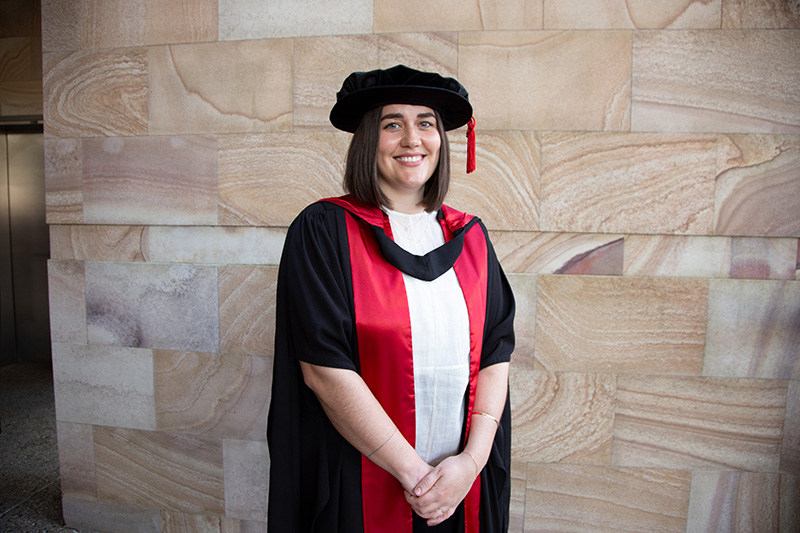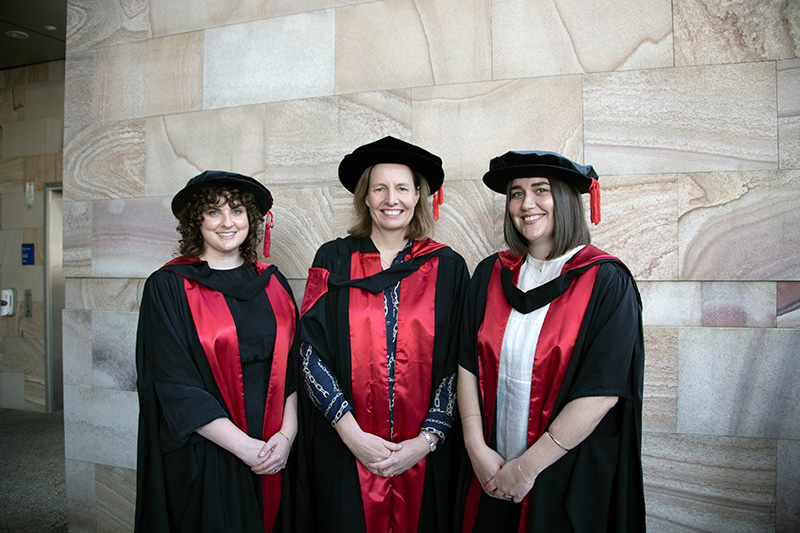Graduates of UQ’s School of Public Health are armed with the knowledge and skills to make a meaningful global impact, addressing complex health challenges and striving to improve the wellbeing of communities worldwide.
With a strong commitment to tackling the evolving health needs of a changing and inequitable world, the School’s programs empower graduates to lead with purpose and drive positive change.
As we celebrate the achievements of our 2024 graduates, we acknowledge the dedication, perseverance, and academic excellence that have shaped their journeys at UQ.
Meet Hollie and Ally, two outstanding individuals who have earned their Doctor of Philosophy (PhD) this year. Having navigated the postgraduate journey themselves, they are here to share their experiences and offer valuable advice for students considering a similar path.
Dr Hollie Bendotti
 Tell us about your PhD topic
Tell us about your PhD topic
“My PhD was in developing a chatbot smartphone app, based in Quitline counselling calls, to help people quit smoking. I had the unique opportunity to draw upon lived experiences and co-design the chatbot alongside consumers and smoking cessation professionals.”
Who did you work with as part of your PhD?
“My primary supervisor was a thoracic physician at the Prince Charles Hospital, named Associate Professor Henry Marshall, and my co-supervisors were Associate Professor Sheleigh Lawler and Professor Coral Gartner from School of Public Health, and also Dr David Ireland from the CSIRO Australian e-Health Research Centre.
It was a really great experience to have such a multidisciplinary supervisory team, that gave me the opportunity to lead this project and collaborate with multiple different institutions.
I learnt that you can't do anything by yourself or in isolation. You always need to work with organisations and consumers and really build up
relationships to ensure the sustainability of what you're trying to achieve. I really want to thank my supervisors for that – we were a great team!”
What’s next for you?
“I'm currently working as a part-time postdoctoral research fellow at School of Public Health with Sheleigh Lawler, where I’ll be working on projects around the tobacco and vape retail space in Queensland and UQ staff and student knowledge, attitudes, and behaviours related to smoking, vaping and UQ smokefree policy.
I’m also continuing part-time as a postdoctoral research fellow with Henry Marshall at Prince Charles Hospital, where I'll be working on a clinical trial that's evaluating the acceptability and feasibility of introducing lung cancer screening pathway into Quitline counselling and whether people undergoing lung cancer screening need more intensive support to quit smoking. I’ll also be continuing work on the chatbot, as well as some other smoking and vaping cessation projects.”
What advice would you give to future students?
“If you're interested and have the right support, and the opportunity presents itself, just have a go! You’ll make some really great professional and personal relationships.”
Dr Ally Robbins-Hill
 Tell us about your PhD topic
Tell us about your PhD topic
“My PhD topic focussed on understanding the socioecological drivers on behaviour change during the Covid-19 pandemic.
I was actually doing a different topic for nearly 18 months when the Covid-19 pandemic started, which made my previous PhD topic pointless. I was initially looking at hand hygiene in daycare centres, and then the whole world got hand hygiene intervention. So, I pivoted; my supervisors and I took the opportunity to focus on hand hygiene in the community during the pandemic, but we eventually broadened the scope to consider all of the behaviours that we were required to change, including social distancing and wearing masks.”
How did you discover this study area?
“I did my Bachelor of Health Sciences at UQ, majoring in health promotion, as well as a Master of International Public Health. Then I started my PhD after that.
I’d spent some time working in the public health sector and I'd always had an interest in infectious diseases, so wanted to come back and move into that area more specifically.
That’s how I found my supervisors; I was working with Professor Simon Reid initially and Associate Professor Sheleigh Lawler was able to add a behavioural science and psychology aspect.”
What’s next for you?
“I’m currently working as an Assistant Director of the Data Strategy Section in the Australian Centre for Disease Control (CDC) Establishment Taskforce. So, I feel lucky to have secured a job that aligns with my area of research. Our work focusses on optimising the use of data for public health purposes by the CDC.
What advice would you give to future students?
“I know it's sounds pretty cliche, but networking is important!
Every career move I've made so far has been based on relationships I’ve made during my studies; with both students and staff. It’s really important to network with your colleagues, stay in contact and make good connections. Make sure you share what you’d like to achieve with the people around you.”
Associate Professor Sheleigh Lawler
Head of School, UQ School of Public Health
UQ is one of Australia’s top research-intensive universities, and our research makes a significant impact on the world’s cultural, environmental, economic, and social challenges.
A key part of this research is the guidance and support provided by inspiring academics like Associate Professor Sheleigh Lawler, who has been a dedicated supervisor to both Ally and Hollie throughout their doctoral studies.
What advice would you give to students considering PhD study?
“The key is meeting with supervisors and making sure they’re the people that you’d like to work with. It's a minimum 3.5-year life commitment, so you want to make sure you get along with your team and your topic is something that you’re passionate about.
There will be times where it’s tough and you’ll really need that support team around you to keep you going. Your supervisors and the School of Public Health community is here to help you achieve your goals.”

Explore our UQ research programs and find out how you can study a Doctor of Philosophy (PhD), Master of Philosophy (MPhil) or professional doctorate at one of the world’s leading research universities.



